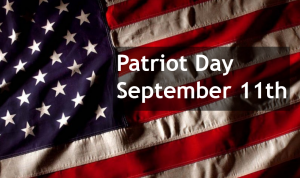 This weekend we observe the fifteenth anniversary of 9/11, the day the United States was attacked by an international terrorist organization, both towers of the World Trade Center came down, the Pentagon was badly damaged, a 4th plane went down in a field in Pennsylvania, and thousands of Americans lost their lives in horrible fashion. It was a very dark day in our history, and I am certain that all of us who were around at the time can remember where they were and what they were doing. For me, I was driving my older son to school and was listening to the car radio as events unfolded. I will never forget a short while later when my younger son announced with (perhaps unintentional) sardonic wit, “Well, now I’ve got something for Current Events!” Classes were canceled at Washington University, and everyone sat around watching the follow-up afternoon news on big-screen televisions. To this day I think of September 10, 2001, a day of minor personal importance, as the last normal day in America.
This weekend we observe the fifteenth anniversary of 9/11, the day the United States was attacked by an international terrorist organization, both towers of the World Trade Center came down, the Pentagon was badly damaged, a 4th plane went down in a field in Pennsylvania, and thousands of Americans lost their lives in horrible fashion. It was a very dark day in our history, and I am certain that all of us who were around at the time can remember where they were and what they were doing. For me, I was driving my older son to school and was listening to the car radio as events unfolded. I will never forget a short while later when my younger son announced with (perhaps unintentional) sardonic wit, “Well, now I’ve got something for Current Events!” Classes were canceled at Washington University, and everyone sat around watching the follow-up afternoon news on big-screen televisions. To this day I think of September 10, 2001, a day of minor personal importance, as the last normal day in America.
In the years that followed people found various ways to the remember what had happened, something that I am certain will happen this year too. One of my favorites came from Norman Katz, a faculty member in the Department of Systems Science and Engineering at Washington University, who in his classes in engineering mathematics would read aloud this little-known 4th verse from “America the Beautiful”:
O Beautiful for patriot dream
That sees beyond the years
Thine alabaster cities gleam,
Undimmed by human tears!
America! America! God shed His grace on thee,
And crown thy good with brotherhood
From sea to shining sea!
Things have never been the same since 9/11. Like it or not, we have given up liberties in the interest of increased security, the most obvious example for travelers being the hassles we have to go through in airports today. We are anxious about all manner of threats to our national security and to our personal security. Perhaps most insidious are threats to the well-being of people and organizations in the invisible world of cyberspace.
Our response to these 21st century threats must be both cautious and optimistic. We cannot be naive: we have to do what is prudent to protect ourselves and those that we love, along with our businesses, our schools, and our government. At the same time, we cannot live our lives in a climate of fear, otherwise the terrorists have won. I believe it is our duty as Americans to take all the right precautions – and our duty as engineers to help develop new technologies that enhance our security without being too intrusive – but in the end it is also our duty to live life with the openness and optimism that our way of life, defined and protected by the U.S. Constitution, affords us.
Life is an amazing adventure. 9/11 was a serious, tragic chapter in that story, but we cannot let it define who we are or what we stand for. I remain, as ever, grateful for the many joys and opportunities that have come my way. My sincere hope is that the majority of you feel the same way.
– Dan
Daniel R. Fuhrmann
Dave House Professor and Chair
Department of Electrical and Computer Engineering
Michigan Technological University